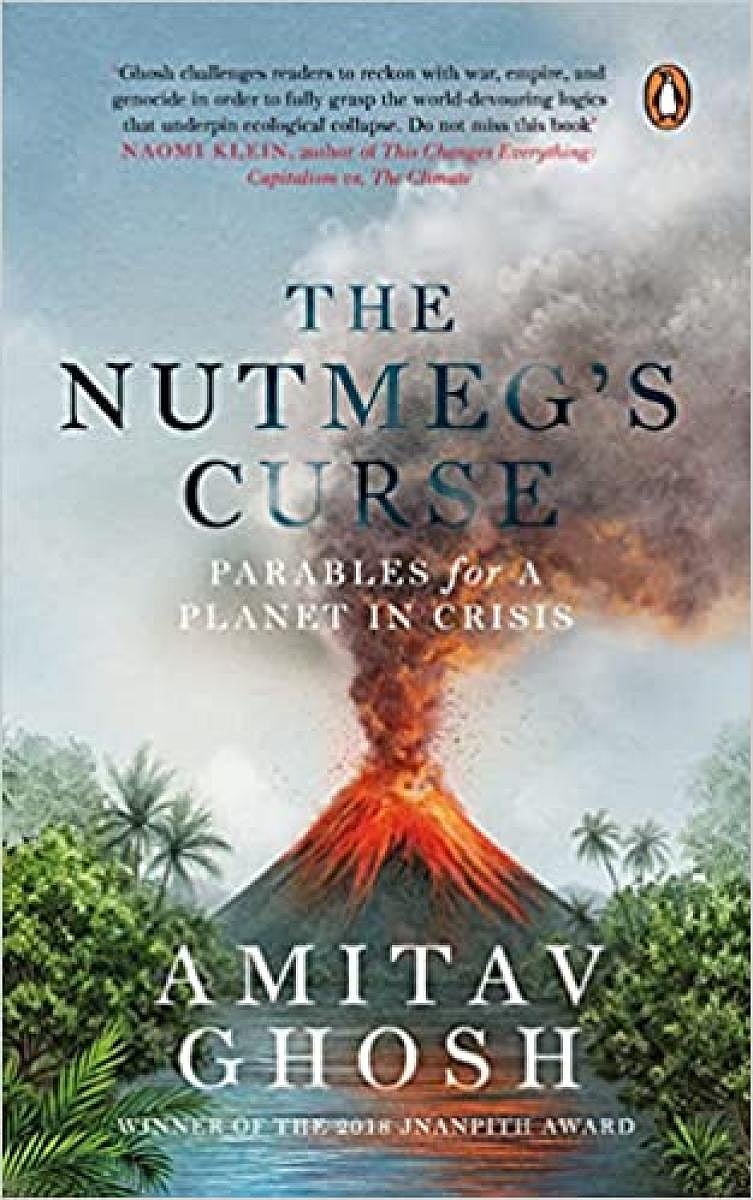
“The modern gaze sees only one of the nutmeg’s two hemispheres: that part of it which is Myristica fragrans, a subject of science and commerce. The other half eludes it because it will only manifest itself in songs and stories.” Indeed, this is the story of climate change itself, as Amitav Ghosh tells us in ‘The Nutmeg’s Curse: Parables for a Planet in Crisis’. The modern gaze sees the climate crisis through the mechanistic mode of thinking where the non-human voice has no place.
The book opens with the Banda Islands, home to the much-sought-after nutmeg. The Dutch East India Company’s quest to exploit the resources of the Maluku (Indonesia), primarily the nutmeg, led to the Bandanese genocide in 1621.
Ghosh places the nutmeg at the centre of the narrative, returning to the fate of the spice and the people of the Banda Islands constantly to tell us about how colonialism not just led to the plundering of precious resources but also to the “extermination” of people through the erasure of the very world that nourished and sustained them — be it through deforestation, destruction of landscapes and animals, and songs, myths and stories.
A wiping out of meaning
Ghosh introduces the reader to “terraforming”, the powerful weapon that colonial powers used to wipe out the meanings of the land and its elements that they took over. He talks about the Diné or the Navajo people, the Indigenous people who belonged to parts of what is now Arizona, Utah, New Mexico, and Colorado. In the mid 19th century, the Diné were not just driven out but their food stocks, livestock, and orchards were eliminated. Drawing specific attention to settler-colonial conflicts, the author says it involved a permanent state of war where non-humans or “other-than-human-beings” were part of the conflict.
This meant the forests, rivers, animals, and plants. Terrains were remade to suit the European/Western conception of what productive land was, and to fit into their lifestyles.
The book teems with many such examples and forgotten stories, apart from delving into etymology — massacre for instance, originally meant a butcher’s block (French) and later came to be used for sectarian mass killings. The word was co-opted by the British East India Company to slowly give it a “halo of religious martyrdom around the execution of its officials,” Ghosh says, pointing out that the word played a role in making the execution of 10 Englishmen at Ambon Island (in Indonesia) in 1623 an event that the world would remember while the wiping out of several thousand Bandanese from memory would not be of historical significance.
This is not to say that Ghosh doesn’t discuss the more recent events of the 20th century that have led to the planetary crisis. He draws attention to how access to oil lies at the core of geopolitics and power hierarchies globally, the role fossil fuels play in modern-day conflict, and how increased militarisation has turned into a key driver of climate change.
The Pentagon, the seat of the US military, for instance, is the single biggest consumer of energy in the US, and probably, one of the leading consumers across the world.
Lending an ear
Writing this in 2020, at a time when the Covid-19 crisis took over the world, Ghosh also points out the global inequities and how the pandemic and extreme weather events have wreaked the greatest havoc in countries that have huge disparities — the US, with its race divisions and India, where caste hierarchies are deep.
This is, in a sense, a culmination of all his previous work — here you find the threads that ran through his earlier books, from colonialism and migration to etymology, songs, legends, and myths. Earlier, in ‘The Great Derangement’, Ghosh explored climate change through the lens of stories, politics, and history. He followed it up with ‘Gun Island’, a work of fiction, which also anchors on the idea of lending voice to the non-humans. Ghosh draws on legends and myths and how intrinsic they are to the people living in a specific region, in this case, the Sunderbans. In his recent ‘Jungle Nama’, he retells the story of Bon Bibi, the guardian spirit of the jungle, and Dokkhin Rai, the tiger, lending voice to both of them.
While stating that it would be self-defeating to reject the scientific approach to the climate crisis, he notes that it is equally self-defeating to reject ideas not founded on mechanistic ways of thinking.
Although he acknowledges the role of science, Ghosh clearly is convinced that the world needs to pay attention to voices that are vitalist and non-mechanist to take on the planetary crisis.
There is extensive research here and so many nuggets of information and ideas that one may need more than one reading for all the disparate themes and thoughts to come together.